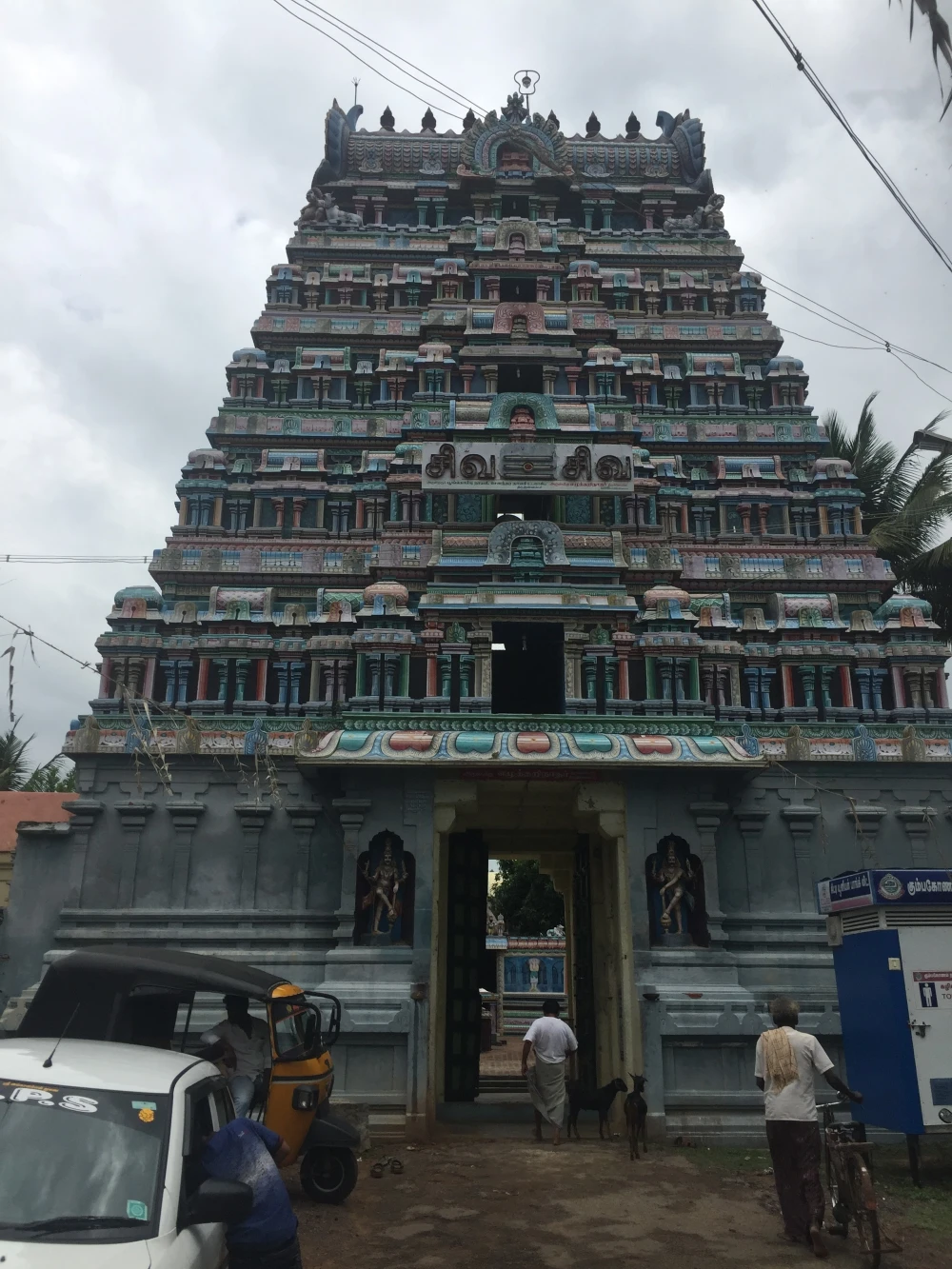In a Chola kingdom, Sudasman, a staunch devotee of Shiva and an accountant, faced a daunting task: to present complex temple accounts to the king by the next day or face death. Distressed, he fervently prayed to Shiva for help. Miraculously, Shiva disguised himself as Sudasman and submitted the impeccable accounts to the king, who was immensely pleased. The following morning, unaware of the divine intervention, Sudasman approached the court in fear. The king, delighted with the previous day's perfect accounts, praised and rewarded him. Confused, Sudasman later learned in a dream that Shiva had saved him. Thus, Shiva is revered as Ezhutharinathar (the Lord who writes), and in Sanskrit, Akshara Pureeswarar.

Ezhutharinathar Temple
Ezhutharinathar temple is located at the Innambur village, in Thanjavur district of TamilNadu. The main deity of this temple is Ezhutharinathar (Lord Shiva) and his two consorts Nithya Kalyani and Sugandha Kundhalambigai. Apart from Lord Shiva, Lord Ganesha, Murugan, Lord Sun, Lord Moon, Bairavar, Natarajar and Dakshinamoorthy are sub-deities of this temple. Ezhutharinathar temple is nearly 1500 years old.
Timings
The temple is open from 6:00 a.m. to 11:00 a.m. and from 5:00 p.m. to 8:00 p.m.
Entry Fee
No entry fee is charged
Do's and Don'ts
- Pray Your Ishta Devata: Before visiting the temple, offer prayers to your personal deity.
- Contact Temple Information Centre: For enquiries, temple information, and details about Poojas.
- Reserve Travel and Accommodation: Book your travel and accommodation well in advance.
- Bathe and Wear Clean Clothes: Before entering the temple, ensure cleanliness.
- Concentrate on God and Goddess: Maintain focus on the deities inside the temple.
- Maintain Silence: Recite your Ishta Mantra quietly inside the temple.
- Follow Customs and Traditions: Observe ancient customs and traditions.
- Respect Religious Sentiments: Be mindful of others' religious sentiments.
- Deposit Offerings in Hundi: Place your offerings only in the designated hundi.
- Purpose Other than Worship: Do not visit the temple for purposes other than worship.
- No Smoking or Alcohol: Smoking and consumption of alcoholic drinks are strictly prohibited.
- No Non-Vegetarian Food: Avoid eating non-vegetarian food within the temple premises.
- No Mediators for Quick Darshan: Refrain from approaching mediators for quick darshan, which may inconvenience others.
- No Weapons: Weapons are not permitted inside the temple.
- No Head Guards: Remove helmets, caps, turbans, or hats inside the temple.
- No Sastanga Pranama in Sanctum Sanctorum: Do not perform full prostration inside the Garbhagriha.
- Brief Sparsa Darshanam: Avoid lingering too long during Sparsa Darshanam (physical contact with deity).
- Avoid Spurious Prasadams: Purchase prasada’s only from authorised sources, not street vendors.
- Do Not Encourage Beggars: Refrain from giving alms to beggars within temple premises.
- Maintain Cleanliness: Do not spit or create any nuisance in the temple premises.
Dress Code
For Men: Wear traditional Indian attire such as dhoti, veshti, or pajama-kurta. A shirt or kurta is suitable.
For Women: Wear traditional Indian attire such as saree or salwar kameez. Choose modest attire that covers shoulders and legs appropriately.
How to reach
By Air: The nearest airport is Tiruchirappalli International Airport (TRZ), approximately 70 kilometers away. From the airport, you can hire a taxi or use public transportation to reach Innambur.
By Train: The nearest major railway station is Tiruchirappalli Junction, which is well-connected to major cities across India. From Tiruchirappalli Junction, you can take a taxi or bus to Innambur.
By Road : The nearest bus stand is Kumbakonam Bus Stand, which is 11.6 kilometres away.
Nearby Cities and Rivers
Rivers:
- Cauvery : It is close to the sacred Cauvery River, known for its spiritual significance in South India.
Cities :
- Tiruchirappalli (Trichy): Known for its ancient temples including the Sri Ranganathaswamy Temple and the Rock Fort Temple, Tiruchirappalli is a bustling city with a rich cultural heritage.
- Thanjavur: Famous for the Brihadeeswarar Temple, a UNESCO World Heritage site, Thanjavur is a center of art, religion, and culture in Tamil Nadu.
- Karur: A major hub for textile industries, Karur is also known for its ancient temples like the Pasupatheeswarar Temple and the Kalyana Venkataramana swamy Temple.
- Erode: Known as the "Turmeric City" for its significant production of turmeric, Erode is an important center for agriculture and commerce in Tamil Nadu.
- Salem: Famous for its mangoes and silver jewelry, Salem is also known for its historic temples like the Kottai Mariamman Temple and the Sugavaneswarar Temple.